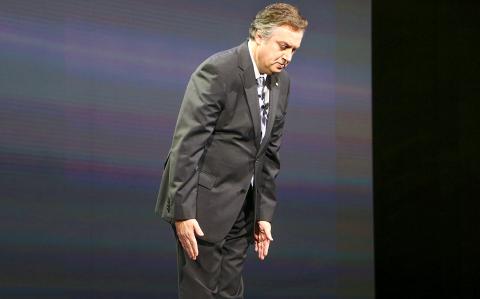Nissan Motor Co executive vice president Daniele Schillaci yesterday bowed deeply for several seconds in a Japanese-style apology, expressing his remorse for widespread illegal inspections at the automaker.
“I would like to take this opportunity to express a sincere apology for our recent issues,” he said at the Nissan booth at the Tokyo Motor Show. “We sincerely regret any inconvenience and concern this has caused our valued customers.”
This year’s show highlights “smart” and “green” vehicles that talk, connect online and stop on their own before crashes, but scandals surfacing within weeks of the auto show, including another one at Kobe Steel that has hit the entire industry, are casting a shadow over the festivities.

Photo: AP
Schillaci switched from his nearly tearful apology to an upbeat demeanor after a resonating electronic beep — the special sound called Canto, designed for Nissan electric cars to protect pedestrians.
Electric cars are extremely quiet compared with gas-engine cars and people have complained about not being aware of their approaching.
“What you just heard is the sound of the future,” he said, proceeding happily with his presentation on automated driving and electric sports cars.
Taking center stage at the Nissan booth was a sleek zero-emissions electric “concept” car, billed as “Nissan intelligent mobility.”
It comes with surrounding 360° sensors capability from radars, cameras, lasers and sonars, to deliver accident-free driving, as well as a future in which the car can drop its owner off somewhere before parking or returning home, Schillaci said.
Japanese automakers have been hit by a series of scandals in recent years, including a massive recall of defective airbags made by Japanese supplier Takata Corp that involves about 100 million airbag inflators worldwide. The defect has been linked to 19 deaths and dozens of injuries.
The global industry has also been rocked by a scandal at Volkswagen AG of Germany over cars it had illegally rigged to cheat on US emissions tests.
Nissan, allied with Renault SA of France, acknowledged last month inspection irregularities had been going on for years at its plants in Japan, with the final inspections routinely done by unauthorized staff.
Shortly after apologizing for that, Nissan said the illegal checks had continued.
It has halted production in Japan for the domestic market until it can figure out how a recurrence can be prevented.
Nissan company officials said the practice was so ingrained it was hard to change. Better communication is needed among managers and production will not resume until the government gives its approval.
Thousands of cars will have to be reinspected.
“We have formed an investigative team with a third party, which is working hard to find out what happened and why,” Schallaci said.
The other scandal, over the falsification of data at Kobe Steel, spans dozens of products made of steel, aluminum, copper and other materials, affecting about 500 companies including major automakers around the world and the aircraft, electronics and railway industries.

ISSUES: Gogoro has been struggling with ballooning losses and was recently embroiled in alleged subsidy fraud, using Chinese-made components instead of locally made parts Gogoro Inc (睿能創意), the nation’s biggest electric scooter maker, yesterday said that its chairman and CEO Horace Luke (陸學森) has resigned amid chronic losses and probes into the company’s alleged involvement in subsidy fraud. The board of directors nominated Reuntex Group (潤泰集團) general counsel Tamon Tseng (曾夢達) as the company’s new chairman, Gogoro said in a statement. Ruentex is Gogoro’s biggest stakeholder. Gogoro Taiwan general manager Henry Chiang (姜家煒) is to serve as acting CEO during the interim period, the statement said. Luke’s departure came as a bombshell yesterday. As a company founder, he has played a key role in pushing for the

China has claimed a breakthrough in developing homegrown chipmaking equipment, an important step in overcoming US sanctions designed to thwart Beijing’s semiconductor goals. State-linked organizations are advised to use a new laser-based immersion lithography machine with a resolution of 65 nanometers or better, the Chinese Ministry of Industry and Information Technology (MIIT) said in an announcement this month. Although the note does not specify the supplier, the spec marks a significant step up from the previous most advanced indigenous equipment — developed by Shanghai Micro Electronics Equipment Group Co (SMEE, 上海微電子) — which stood at about 90 nanometers. MIIT’s claimed advances last

CROSS-STRAIT TENSIONS: The US company could switch orders from TSMC to alternative suppliers, but that would lower chip quality, CEO Jensen Huang said Nvidia Corp CEO Jensen Huang (黃仁勳), whose products have become the hottest commodity in the technology world, on Wednesday said that the scramble for a limited amount of supply has frustrated some customers and raised tensions. “The demand on it is so great, and everyone wants to be first and everyone wants to be most,” he told the audience at a Goldman Sachs Group Inc technology conference in San Francisco. “We probably have more emotional customers today. Deservedly so. It’s tense. We’re trying to do the best we can.” Huang’s company is experiencing strong demand for its latest generation of chips, called

GLOBAL ECONOMY: Policymakers have a choice of a small 25 basis-point cut or a bold cut of 50 basis points, which would help the labor market, but might reignite inflation The US Federal Reserve is gearing up to announce its first interest rate cut in more than four years on Wednesday, with policymakers expected to debate how big a move to make less than two months before the US presidential election. Senior officials at the US central bank including Fed Chairman Jerome Powell have in recent weeks indicated that a rate cut is coming this month, as inflation eases toward the bank’s long-term target of two percent, and the labor market continues to cool. The Fed, which has a dual mandate from the US Congress to act independently to ensure